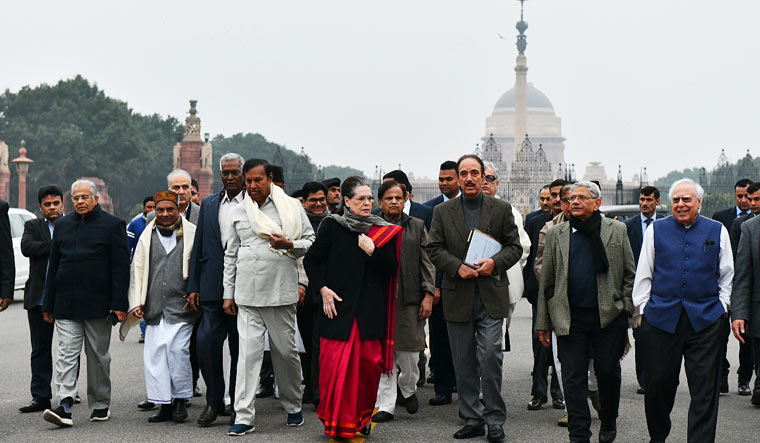On May 22, when Congress President Sonia Gandhi got 22 opposition parties on board to discuss the socio-economic impact of the Covid-19 pandemic, it turned into a spectacular show of unity of “like-minded parties”—a euphemism to describe these parties opposed to the BJP. The participants included veteran leaders, regional satraps and three chief ministers.
On expected lines, the opposition grouping listed a number of demands for the Union government. These include direct cash transfer to the poor, free transportation for all migrant workers, distribution of free food grains, financial help for the states, and a revised and comprehensive fiscal stimulus package.
There was a lot to discuss at the meeting, with the leaders unburdening themselves with regard to the Centre's perceived one-upmanship and its undermining of the role of the states in decision-making. They complained about Prime Minister Narendra Modi highlighting his own leadership role in the fight against Covid-19, while leaving the challenge of curbing the disease mainly to the states.
As it is increasingly becoming clear that this fight will be a long-drawn one with a steep human cost, the opposition senses an opportunity to hold the prime minister and the BJP politically responsible.
“We have adopted a positive approach and offered constructive criticism to the government,” said Dravida Munnetra Kazhagam leader Tiruchi Siva. “And, then came a time when we felt that in view of the scope of the mishandling of the situation, opposition parties should come together to convey a strong message to the government.”
The spotlight is on the migrant crisis, massive unemployment and the economy slipping into a recession. The opposition feels that these issues were relevant even before the Lok Sabha elections, but were lost in the post-Pulwama nationalistic cacophony.
“I even shudder to think that this could be considered an attempt to take on the government politically,” said Manoj Jha, Rashtriya Janata Dal’s Rajya Sabha MP. “Rather, we want to convince the government about what it needs it to be done.” However, how successful the opposition will be in its endeavour to turn the situation politically in its favour is yet to be seen. The May 22 meeting was a coup of sorts as the Shiv Sena, represented by Maharashtra Chief Minister Uddhav Thackeray, took part in the opposition gathering for the first time. Also, on board was West Bengal Chief Minister Mamata Banerjee, despite the left parties also participating.
Also Read
- Sam Pitroda says '55% inheritance tax' remark twisted by BJP to divert attention
- Explainer: The Congress manifesto and the controversy around wealth inequality
- ‘Stone pelting, beheading of soldiers would have continued if Cong was in power: Modi
- PM Modi will never say 40 pc of country’s wealth is with just 1 pc of population: Cong
- BJP expels former Karnataka deputy CM Eshwarappa for 6 years
However, it took the opposition parties two months since the Covid-19 outbreak to have their first meeting to discuss the situation—an indication of the difficulties involved in bringing the diverse players together. According to Congress sources, the party had been working for the past one month to have an opposition meeting through video-conferencing and had sent out feelers to other parties.
The Congress had to do a delicate balancing act to get Mamata and the left to share stage. It is learnt that suggestions made by CPI(M) General Secretary Sitaram Yechury were read out by a Congress leader, and there was a gentle nudge to the left leaders to avoid criticising the West Bengal government's handling of the Covid-situation. In Maharashtra, the fault line in the ruling alliance came to the fore after former Congress president Rahul Gandhi commented that his party is not the key decision-maker in the state. It was construed as an attempt to distance the party from the state government's handling of the crisis. It took some hectic firefighting efforts to scotch speculation about the Thackeray government being in trouble.
Important regional players in Uttar Pradesh—the Samajwadi Party and the Bahujan Samaj Party—declined the invitation to participate in the meeting, bringing out the inner contradictions in the opposition camp. The two parties have not been comfortable with the moves being made by All India Congress Committee General Secretary Priyanka Gandhi Vadra in UP—especially the furore over Vadra's offer to provide a thousand buses to ferry migrant workers to their hometowns.
The Aam Aadmi Party, on the other hand, was not invited. The Congress has not been very comfortable with giving the AAP space in the opposition grouping, considering that Arvind Kejriwal's party has taken away its vote bank in Delhi. The Kejriwal government is also viewed as trying to build a working relationship with the Union government even as it is engaged in a fierce political fight with the BJP in Delhi.
Congress leader Randeep Surjewala said the government cannot afford to ignore the opposition's demands. “These parties represent more than 60 per cent of India,” he said. The manner in which opposition parties keep up the pressure will have to be different from the past. They cannot hit the streets and hold agitations, and the challenge before them is to find innovative ways of making an impact. “We will take up the issues forcefully,” said CPI General Secretary D. Raja. “No party can lie low at a time like this.”



